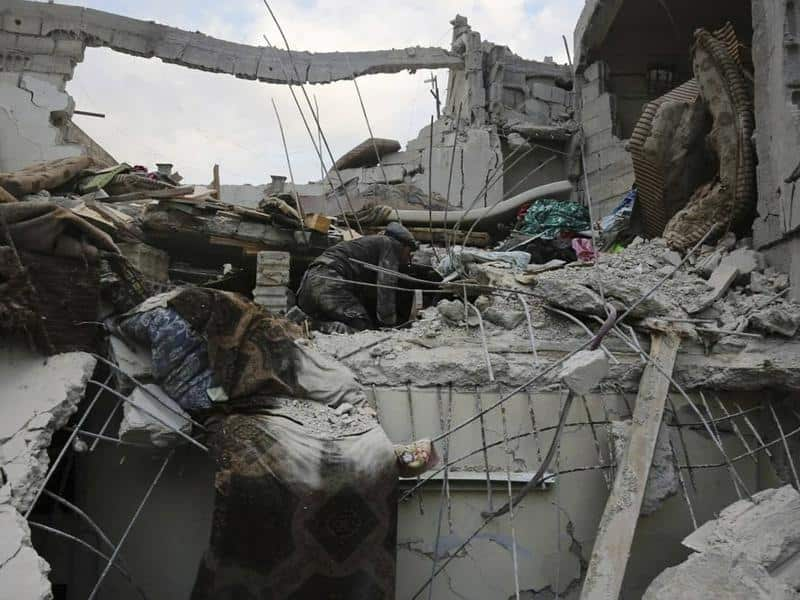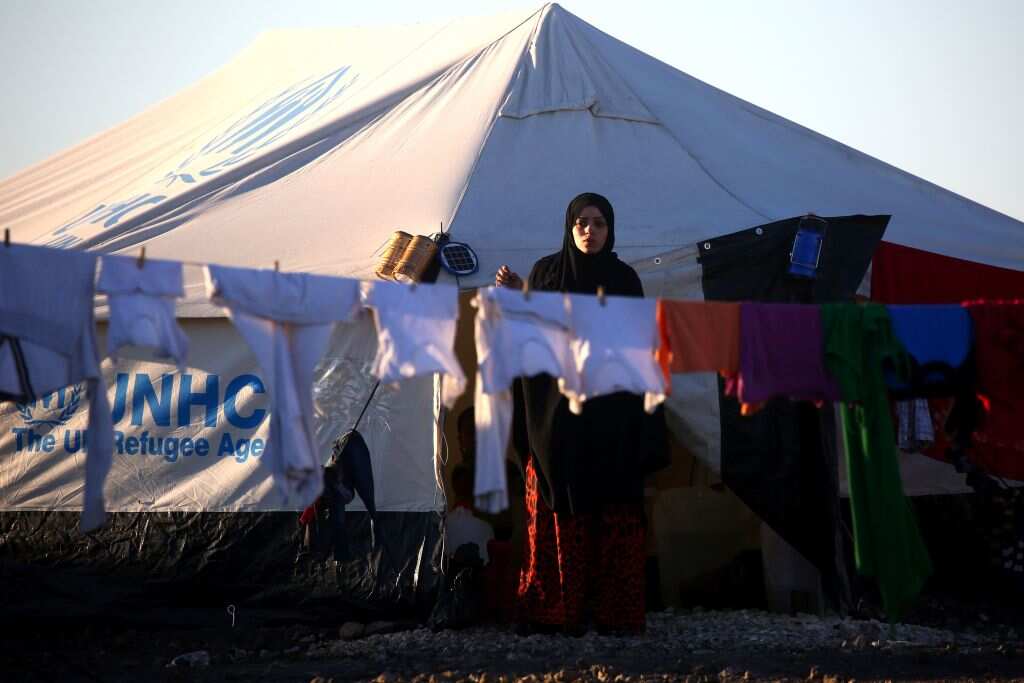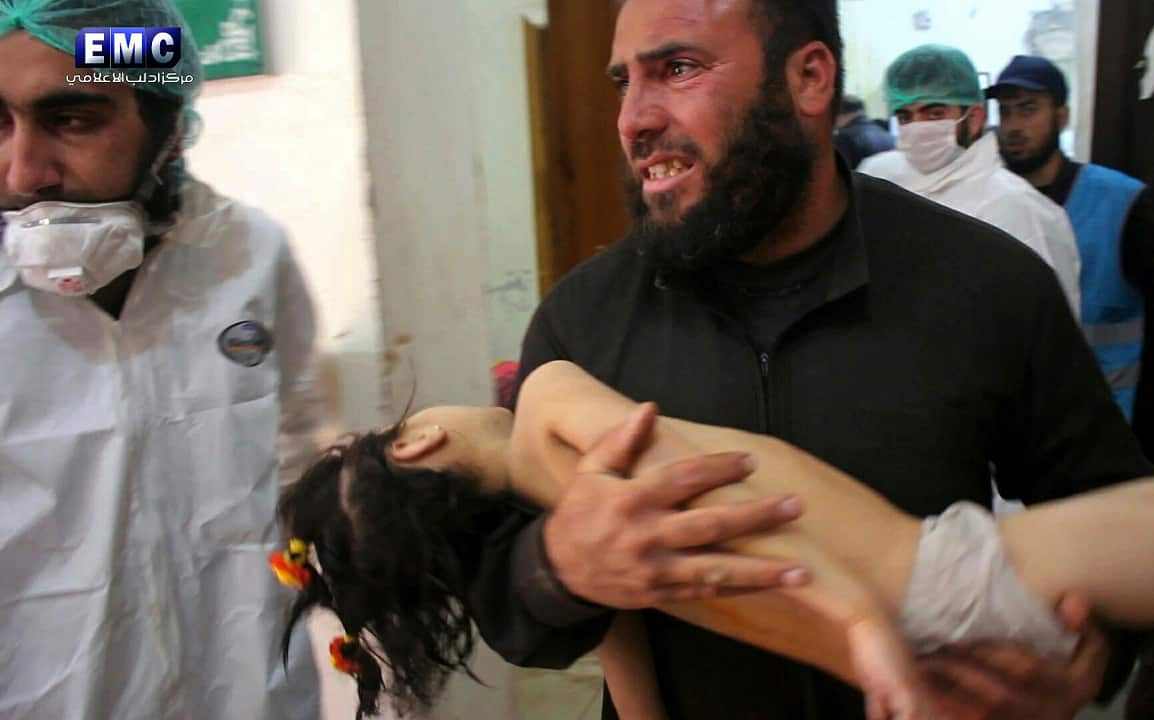More than 400 people have been killed in the five-day assault by the government on Eastern Ghouta where UN Secretary-General Antonio Guterres said 400,000 Syrians are living in "hell on earth".
Despite a crippling siege, infighting and a ferocious wave of bombardment, Syrian rebels have clung on to their Eastern Ghouta stronghold near Damascus - but a looming ground offensive might finally oust them.
The Damascus government is also accused of carrying out chemical attacks on Eastern Ghouta and other areas.
Victims were found convulsing and foaming at the mouth following the deadly incident, which Western nations - including the United States, have blamed Syrian President Bashar al-Assad's government of being behind.
The United Nations has estimated more than five million people have now fled the war-torn nation as refugees since the start of the conflict.
Inside Syria, humanitarian efforts have focused on providing aid, such as food, clean water, medicine and shelter.
Several aid agencies have been set up in the Syria and neighbouring countries, to deal with the mammoth humanitarian effort. Here's where you can donate to the efforts:
The United Nations High Commissioner for Refugees (UNHCR) is one of the leading agencies offering aid to people struggling inside Syria. The organisation's main objective is to offer humanitarian aid for refugees, as well as helping the most vulnerable with cash for medicine and food, stoves and fuel for heating, insulation for tents, thermal blankets and winter clothing. UNICEF's Syria Crisis Appeal has delivered emergency supplies and protection to millions of children caught up in the conflict and living on the move as refugees. The organisation has several teams on the ground in Syria's most dangerous regions, to supply children and families with much-needed essentials, including food, medicine, clean toilet facilities, vaccinations and clothing.
UNICEF's Syria Crisis Appeal has delivered emergency supplies and protection to millions of children caught up in the conflict and living on the move as refugees. The organisation has several teams on the ground in Syria's most dangerous regions, to supply children and families with much-needed essentials, including food, medicine, clean toilet facilities, vaccinations and clothing.

Warplanes have pounded the last rebel enclave near the Syrian border for a fifth straight day. (AAP) Source: AAP (sbs news)
Human rights advocacy organisation Amnesty International has an Action for Aleppo campaign, calling on the Syrian and Russian governments to support the safe evacuation of people from Aleppo and to allow UN monitors to ensure the protection of civilians.
The Australian Red Cross' Syria Crisis Appeal has been offering frontline health services in the country, including access to medicine and psychosocial support for people who have suffered trauma. The organisation estimates it provides aid for up to five million people per month, providing food parcels and safe drinking water, and emergency health care, including first aid and vaccinations. Save the Children Australia's Syrian Refugee Crisis Appeal has several branches for providing humanitarian aid. It provides food, clean water, medicine and shelter, as well as supporting schools and training teachers. It also supports rehabilitation health centres by offering equipment and medication. The organisation says a $52 donation would buy a school bag and a set of winter clothes for one child caught up in the war, while $200 would supply a family of six with shelter, bedding and cooking supplies.
Save the Children Australia's Syrian Refugee Crisis Appeal has several branches for providing humanitarian aid. It provides food, clean water, medicine and shelter, as well as supporting schools and training teachers. It also supports rehabilitation health centres by offering equipment and medication. The organisation says a $52 donation would buy a school bag and a set of winter clothes for one child caught up in the war, while $200 would supply a family of six with shelter, bedding and cooking supplies.

A Syrian woman hangs laundry at a temporary refugee camp in the village of Ain Issa. Source: Getty Images
World Vision is concentrating its efforts on providing aid to refugees displaced inside Syria, and those who have fled to neighbouring Lebanon and Jordan. In Jordan, the organisation has constructed water and sanitation facilities to meet the urgent needs of more than 50,000 people in the northern city of Azraq, which contains a refugee camp built to support the overflow at the Za’atari refugee camp.
CARE Australia has been operating in Syria and countries affected by the huge influx of refugees, including Greece, Serbia, Jordan, Turkey and Lebanon. The organisation, which has helped more than 1.6 million people inside Syria, distributes relief supplies such as food, hygiene kits, mattresses and blankets. Oxfam Australia has reached more than 1.5 million people on the ground in Syria by providing clean drinking water, hygiene and sanitation programs, as well as cash and relief supplies such as blankets and stoves in winter. The organisation says it has brought two water treatment plants back online using multiple truck-sized generators, which has helped to provide clean drinking water to roughly 500,000 people.
Oxfam Australia has reached more than 1.5 million people on the ground in Syria by providing clean drinking water, hygiene and sanitation programs, as well as cash and relief supplies such as blankets and stoves in winter. The organisation says it has brought two water treatment plants back online using multiple truck-sized generators, which has helped to provide clean drinking water to roughly 500,000 people.

A Syrian man carries a child following a suspected chemical attack, at a makeshift hospital, in Khan Sheikhoun town. Source: Edlib Media Centre
Médecins Sans Frontières/Doctors Without Borders offers support to Syrian medics running clinics and field hospitals in Aleppo, Idlib, Hama, Homs, Daraa and Tartus. MSF runs three health facilities in Aleppo, including a facility with 28 beds.
